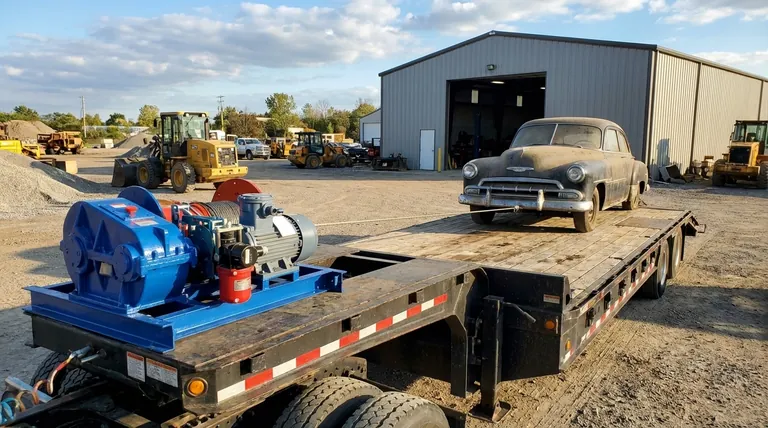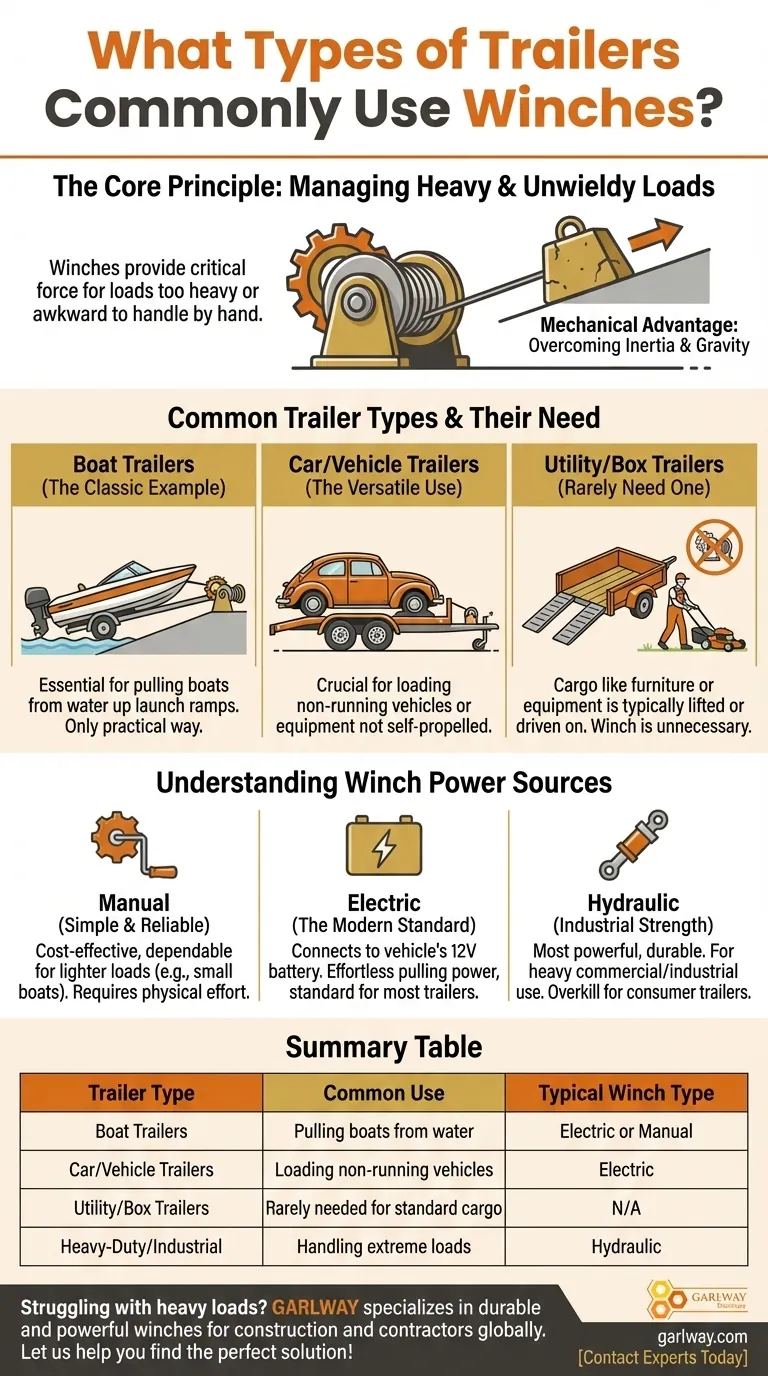At its core, a winch is used on any trailer where a heavy, rolling, or cumbersome load needs to be pulled onto the deck. The most common examples are boat trailers, which need to pull vessels out of the water, and car trailers, which are used to load both running and non-running vehicles. They provide a critical mechanical advantage for handling loads that are too heavy or awkward to manage by hand.
The presence of a winch isn't defined by the trailer type, but by the nature of the cargo. If a load is too heavy or awkward to push or drive on safely—like a boat or a disabled vehicle—a winch becomes an essential tool for controlled loading.

The Core Principle: Managing Heavy and Unwieldy Loads
A winch is a problem-solving tool. Its purpose is to overcome the two primary challenges of loading a heavy object onto an inclined trailer bed: inertia and gravity.
The Problem of Loading
Loading an object weighing thousands of pounds onto a trailer requires immense, controlled force. This is especially true on a sloped surface, like a boat ramp or a tilted trailer bed, where gravity is working against you.
Mechanical Advantage in Action
A winch provides this force through gearing. Whether cranked by hand or powered by a motor, it allows a single person to exert the pulling force of many, ensuring the load moves slowly and safely onto the trailer.
Securing the Load
Beyond loading, a winch also serves as a primary anchor point. Keeping the winch line taut prevents the cargo—especially vehicles or boats—from shifting forward during braking, acting as the first line of defense in a good tie-down strategy.
Common Trailer Types and Their Need for a Winch
While any trailer can have a winch, they are standard equipment on a few specific types for very clear reasons.
The Classic Example: Boat Trailers
A winch is non-negotiable for a boat trailer. It is the only practical way to pull a boat from the water up the incline of a launch ramp and guide it precisely onto the trailer's bunks or rollers.
The Versatile Use: Car and Vehicle Trailers
Car haulers frequently feature winches to handle any situation. They are absolutely essential for loading non-running project cars, classic vehicles you don't want to start, or equipment that isn't self-propelled.
The Exception: Why Utility and Box Trailers Rarely Need One
Most general-purpose trailers don't include winches. Cargo like furniture, landscaping equipment, or construction materials is typically lifted or driven on. Similarly, horse or livestock trailers rely on the animals walking up a ramp, making a winch unnecessary and inappropriate.
Understanding the Trade-offs: Winch Power Sources
The type of winch chosen depends on the weight of the load and the need for convenience.
Manual Winches: Simple and Reliable
A manual winch is operated with a hand crank. It is a cost-effective and dependable solution for smaller, lighter loads like small aluminum fishing boats or jet skis. Their primary drawback is the physical effort required.
Electric Winches: The Modern Standard
Electric winches are the most common type found on trailers today. They connect to the towing vehicle's 12-volt battery, offering effortless pulling power at the push of a button. This convenience and strength make them the standard for most boat and car trailers.
Hydraulic Winches: Industrial Strength
Hydraulic winches are the most powerful and durable type, but they are typically reserved for heavy commercial and industrial applications like construction or refuse vehicles. They are overkill for most consumer-grade trailers.
Making the Right Choice for Your Goal
When evaluating a trailer, think about the most challenging load you plan to move.
- If your primary focus is a small boat or lightweight vehicle: A manual winch is a reliable and cost-effective solution that avoids electrical complexity.
- If your primary focus is a larger boat or recovering vehicles: An electric winch is the correct choice, providing the necessary power and safety for repeated, heavy use.
- If your primary focus is general utility or hauling livestock: A winch is unnecessary, and your resources are better spent on a quality ramp and proper tie-down straps.
Ultimately, the winch is matched not to the trailer itself, but to the specific demands of the cargo you need to manage safely.
Summary Table:
| Trailer Type | Common Use for Winch | Typical Winch Type |
|---|---|---|
| Boat Trailers | Pulling boats from water onto the trailer | Electric or Manual |
| Car/Vehicle Trailers | Loading non-running or delicate vehicles | Electric |
| Utility/Box Trailers | Rarely needed for standard cargo | Not Applicable |
| Heavy-Duty/Industrial | Handling extreme loads in construction | Hydraulic |
Struggling with heavy or awkward loads? GARLWAY specializes in construction machinery, offering durable and powerful winches, concrete mixers, and concrete batching plants for construction companies and contractors globally. Our winches provide the mechanical advantage you need for safe and efficient loading. Let us help you find the perfect solution for your trailer — contact our experts today for a personalized consultation!
Visual Guide

Related Products
- Electric and Hydraulic Winch for Heavy Duty Applications
- Portable Small Trailer Winch
- Warn Winch Windlass Boat Trailer Winch
- Small Electric Winch 120V and 240V for Compact Applications
- 12000 lb Heavy Duty Electric Boat Winch
People Also Ask
- How do hydraulic towing winches perform in terms of power and performance? Unmatched Force for Heavy-Duty Tasks
- What are the advantages and disadvantages of wire rope electric hoists with the motor outside the drum?
- Is using an electric winch simple? Unpacking the Power and Responsibility Behind the Push-Button
- What are the three frame sizes available for winches? Choose the Right Fit for Your Trailer
- How is the winch controlled during operation? Master Safe & Efficient Load Handling
- How does the size of a winch influence the diameter of its drum? A Guide to Load Capacity & Speed
- What are the drawbacks of traditional resistance speed control in hoists? Key Limitations Explained
- How long can you run an electric winch? Master Safe, Efficient Vehicle Recovery


















